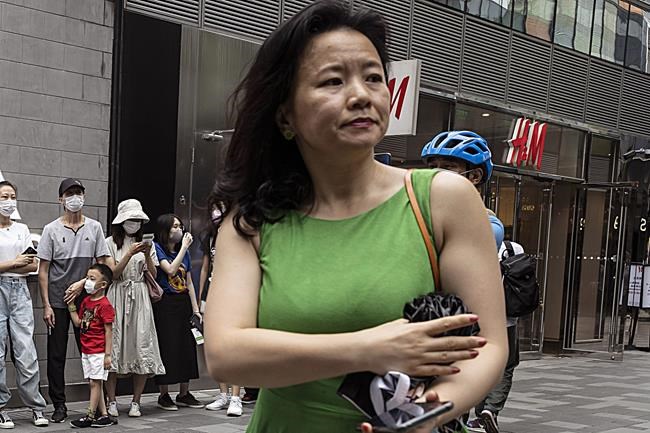
FILE - Cheng Lei, a Chinese-born Australian journalist for CGTN, the English-language channel of China Central Television, attends a public event in Beijing on Aug. 12, 2020. Cheng who worked for China’s state broadcaster and was convicted on murky espionage charges during her three years in detention in China had been returned to Australia, Prime Minister Anthony Albanes said on Wednesday, Oct. 11, 2023. (AP Photo/Ng Han Guan, File)
A Chinese Australian journalist who was convicted on murky espionage charges and detained in China for three years has returned to Australia, Prime Minister Anthony Albanese said Wednesday.
Cheng Lei, 48, worked for the international department of China’s state broadcaster CCTV. She has reunited with her two children in Melbourne, Albanese said.
Her return comes ahead of Albanese’s planned visit to Beijing this year on a date yet to be announced. He will become the first Australian prime minister to visit the Chinese capital in seven years.
Albanese said Australia had traded nothing with China for Cheng’s release.
“Her release follows the completion of judicial processes in China,” he said.
A court in Beijing convicted her of illegally providing state secrets abroad and she was sentenced to two years and 11 months, the statement said. She was deported Wednesday after serving her sentence, presumably because she had already been detained for that long .
“Her return brings an end to a very difficult few years for Ms. Cheng and her family,” Albanese said. “The government has been seeking this for a long period of time and her return will be warmly welcomed not just by her family and friends but by all Australians.”
The FreeChengLei account on X, formerly known as Twitter, posted a photo of Cheng with Australian Foreign Minister Penny Wong and Australia’s ambassador to China, Graham Fletcher.
The post included a quote, apparently from Cheng, that read: “Tight hugs, teary screams, holding my kids in the spring sunshine. Trees shimmy from the breeze. I can see the entirety of the sky now! Thank you Aussies.”
Albanese’s government has been lobbying for the release of Cheng and another Chinese Australian held in China since 2019, Yang Hengjun.
Bilateral relations have improved since Albanese’s center-left Labor Party was elected after nine years of conservative rule. Beijing has lifted several official and unofficial trade barriers on Australian exports.
Albanese’s reference to China’s judicial system suggested that Cheng had recently been sentenced after she was convicted in a closed-court trial last year on national security charges.
Questioned by a reporter, Albanese said China was not acknowledging through Cheng’s release that she posed no threat or had been wrongfully detained.
“No, China would have not have said that that’s the position. China would say that the judicial processes have been completed in China,” Albanese said.
Chinese Foreign Ministry spokesperson Wang Wenbin said that the Chinese judicial system tried the case “in accordance with the law, fully safeguarding the rights enjoyed by the person concerned in accordance with the law.”
Albanese said he spoke to Cheng in Melbourne, where her children have been living with her mother, and that they discussed a letter she had written to the Australian public in August to mark the third anniversary of her detention. The Chinese-born journalist spoke in her letter about her love for her adopted country.
In the letter, she also described her living conditions in detention in China, saying she was allowed to stand in sunlight for just 10 hours a year.
“She is a very strong and resilient person … and when I spoke with her she was delighted to be back in Melbourne,” Albanese said.
Albanese did not say whether Yang was also likely to be released.
“We continue to advocate for Dr. Yang’s interests, rights and wellbeing with the Chinese authorities at all levels,” Albanese said.
Yang, a 58-year-old writer and democracy blogger, told his family in August he fears he will die in a Beijing detention center after being diagnosed with a kidney cyst, prompting supporters to demand his release for medical treatment.
Yang has been detained in China since January 2019, when he arrived in Guangzhou from New York with his wife and teenage stepdaughter.
Yang received a closed-door trial on an espionage charge in Beijing in May 2021 and is still awaiting a verdict.
Yang’s friend, University of Technology Sydney academic Feng Chongyi, said on Wednesday a verdict had been postponed for three months 11 times and the next possible ruling was January.
He said Cheng’s release was good news for Yang. “I do hope Yang is treated in the same way. Given Yang’s poor health, his release is actually more urgent,” Feng said.
___
Associated Press writer Ken Moritsugu in Beijing contributed to this report.
___
This story corrects the name of the Chinese security agency.




